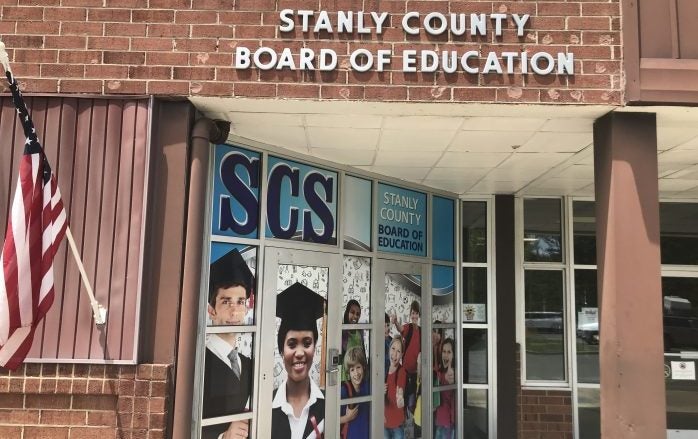Board approves Duke Unversity’s test-to-stay strategy to keep students in school
Published 10:21 am Wednesday, January 5, 2022

- Stanly County Schools is headquartered in Albemarle.
|
Getting your Trinity Audio player ready...
|
In order to reduce Covid quarantines and keep students in school, the Stanly County Board of Education Tuesday night approved taking part in a testing research study that’s been gaining traction across the state.
Researchers at Duke University recently began a test-to-stay strategy with several school districts as an alternative to quarantining.
Participants in schools who have been exposed to the virus receive a rapid antigen test for COVID-19 on the day of exposure (day 1) and at days 3 and 5 following initial known exposure, Superintendent Dr. Jarrod Dennis said.
Students and staff who have been exposed either at school or in the community can take part in the study; the only exception is if they were exposed to the virus via their household or some other congregate living setting.
If the COVID-19 tests are negative, the participants can remain in school, as long as they wear a mask for 10 days. A positive COVID-19 test or the development of symptoms on any day after exposure would require isolation according to requirements outlined in the NC Strong Schools Toolkit.
Under current guidance, anyone exposed to a COVID-positive person needs to quarantine. The earliest they can come back is after five days if they’re asymptomatic and test negative.
Participation in the study is voluntary so students and staff who are interested would have to fill out a form to be included. This will give parents the freedom to decide what is best for their children.
“It’s 100 percent up to whomever if they want to participate,” Dennis said.
Since Stanly County is a mask optional district, participants in the study will not be able to participate in sports or any other extracurricular activities until after day 5, assuming they still test negative. Students could still participate in activities such as field trips.
Duke would provide the tests to the school district for free and also train nurses and other staff who would administer the tests. The Stanly County Health Department also is supportive of SCS’s involvement in the study.
SCS would be part of the second iteration of the program for school districts with voluntary masking, Dennis said. The first took place over six weeks and involved 367 participants from five school districts and one charter school with universal mask mandates.
According to data from the Duke’s ABC Science Collaborative, the initial study found testing children exposed to COVID-19 rather than sending them into quarantine right away saved more than 1,600 school days from being missed and resulted in a transmission rate of about 2 percent.
“The focused ‘test-to-stay’ protocol substantially reduced student absences from school after in-school exposure to COVID-19, keeping more kids in school and on a consistent educational routine,” said Duke professor of pediatrics Dr. Danny Benjamin, co-chairman of the ABC Science Collaborative, in a recent Duke Health press release. “Our research has taught us that ‘test-to-stay’ is a focused, practical way for children to avoid being out of the classroom after an exposure and can be a win-win strategy for keeping our children and schools safe without overwhelming the system.”
Several of the school board members, who had already been briefed on the study, said that while not perfect, the test-to-stay strategy was a better option than continuing to quarantine massive amounts of students and staff, many of whom have been asymptomatic. The week before Christmas break, for example, more than 800 students and staff were out of school.
New Covid cases have exploded across the state as a result of the omicron variant, with Stanly reporting more than 300 cases last week for the first time since late September.
Board Chairwoman Glenda Gibson said she’s spoken with board members from other counties, including Cabarrus, whose districts are participating in the study and they have been impressed by the results.
“You will see a drastic reduction of children that are going to have to go home that are asymptomatic and they have to be home quarantined when they should be in school and they need to be in school,” she said. “I think this board is looking at something here that is very proactive.”
With so many students struggling over the past two years with extended periods of remote learning and quarantining, the hope is that this study can provide some stability.
“Learning loss is a disability that we can prevent,” said board member Bill Sorenson. “We can stop so many kids from being out of school. We’re saving their future.”
Board member Dr. Rufus Lefler noted that while students will temporarily have to wear masks, which is still a divisive issue for many in the community, it is for the greater good of keeping students in school.
“Being out of school and the loss of learning is a lot more detrimental than wearing a mask for 10 days,” he said.
Dennis will contact the researchers involved with the study to let them know the board has approved of the district’s participation.





